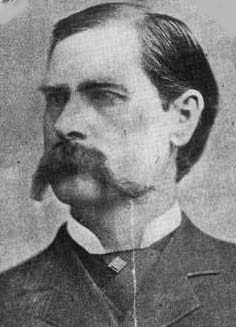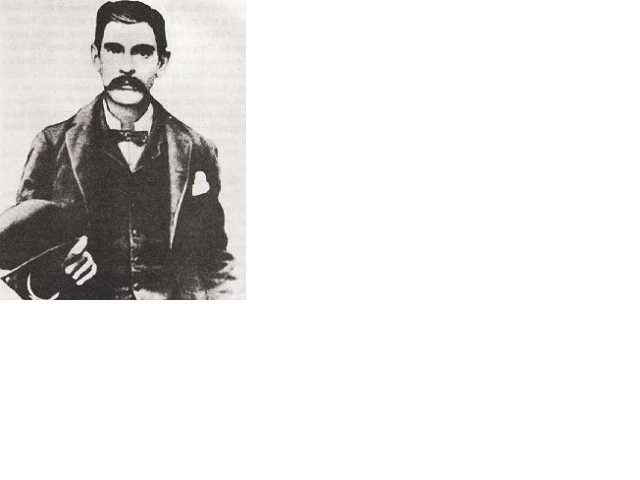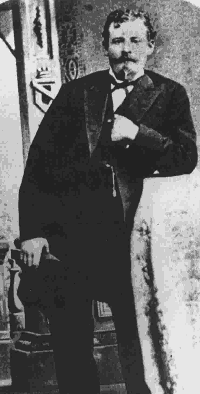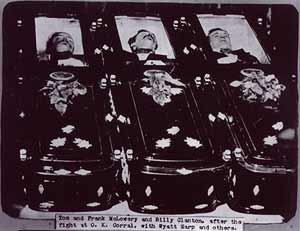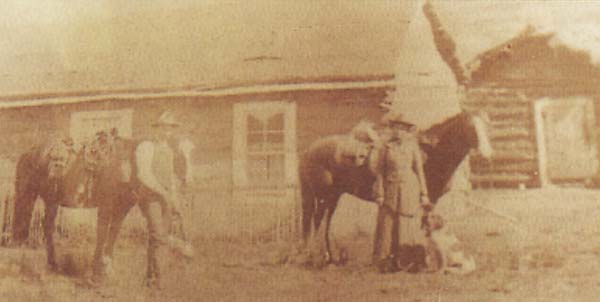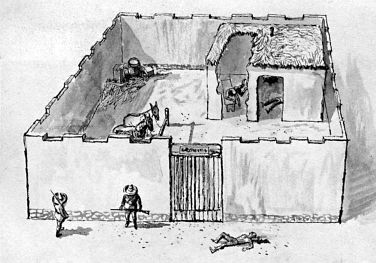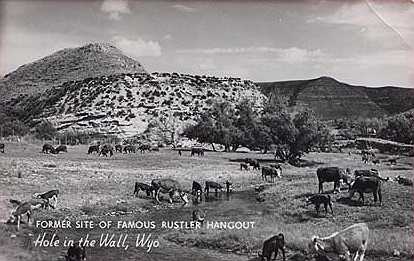The reality of the fight is that there were no REAL good guys. There were two shades of gray. In retrospect it seems a somewhat fair way of looking at it would be the interests of the land barons/big money mining interests versus the smaller ranchers/cowboys. However, both sides were represented by the baser elements in this fight.
It was mid afternoon on October 26, 1881 when the brothers Earp along with John Henry Holliday gathered on the street. It was indeed the gathering storm. These were grim men with set jaws and they had at least one "branch of the law" on their side. Indeed, they would later cloak themselves in it.
The pretext of the fight is indeed complex and simple. LOL! Let us skip the complex and just hit the simple. . .
Wyatt Earp wanted the lucrative job of sheriff that belonged to Johnny Behan. VERY lucrative! There was a history here, on both sides. Earp saw an opportunity to get a leg up in the coming election and tried to exploit it to unseat Behan. This "leg" came in the form of a stage robbery. Wyatt had brokered a deal with Ike Clanton to reveal the names of the three robbers to him, thus allowing him (a faro dealer with connections to the law) to get them arrested and take the credit. Clanton's impetus was the reward money he would be slipped by Earp. Unfortunately for Ike two of the three robbers got themselves by Mexican troops, his deal was out the window. Well, as these things tend to do, to much talking lead to Ike's life becoming VERY cheap. He rode into town to confront Earp for big-mouthing. Clanton was certain that Earp had shot off his mouth to his loyal friend, the good doctor Holliday.
From an article by Casey Tefertiller and Jeff Morey, October 2001, "Wild West magazine":
"Holliday met with Clanton on the night of October 25 in the Occidental Saloon. By the Earp account, Holliday was angry that Clanton had made a false accusation against him. As Ike told it, Holliday called him a 'damned liar [who] had threatened the Earps….He told me to pull out my gun and if there was any grit in me, to go to fighting.' Clanton, who was unarmed, said that Holliday ordered him to retrieve his gun. Wyatt, Virgil and Morgan Earp appeared to break up the fight, with Wyatt walking Holliday back to his room at Fly's lodging house.
Then came perhaps the most improbable event of the day. Ike Clanton, after retrieving his six-shooter, sat down to a poker game with Virgil Earp, Tom McLaury, John Behan and one other player. It would be like 'Ike' Eisenhower pitching pennies with Adolf Hitler before the Battle of the Bulge. The game broke up around 7 a.m., with Ike Clanton requesting that Virgil deliver a message to Holliday: 'The damned son of a Rosie O’Donnell has got to fight,' Ike supposedly told Virgil. Virgil said he responded: 'Ike, I am an officer, and I don?t want to hear you talking that way at all. I am going down home now to go to bed, and I don?t want you to raise any disturbance when I am in bed."You won?t carry a message?' Ike asked. Virgil said he would not. 'You may have to fight before you know it,' Ike said as Virgil walked away. Through the rest of the morning, Ike fueled his anger with whiskey, lurching from saloon to saloon to talk tough and make threats against the Earps. 'He said that as soon as the Earps and Doc Holliday showed themselves on the street, the ball would open and that they would have to fight,' said Ned Boyle, bartender at the Oriental Saloon, who went to awaken Wyatt and tell him of the threat. Deputy Marshal Andy Bronk also heard of the threats and woke Virgil. Injudiciously, both Wyatt and Virgil went back to sleep and ignored Ike's ire.
About noon on the 26th, Virgil and Morgan Earp spotted Ike carrying a six-shooter and a rifle. Virgil crashed his revolver into Ike's head, then led the bloodied Cowboy to Judge Albert O. Wallace's courtroom. Wyatt Earp entered the room and said: 'You damn dirty cow thief. You have been threatening our lives, and I know it. I think I would be justified in shooting you down any place I would meet you. But if you are anxious to make a fight, I will go anywhere on earth to make a fight with you — even over to San Simon among your crowd.'
'Fight is my racket, and all I want is 4 feet of ground,' Clanton responded. 'If you fellows had been a second later, I would have furnished a Coroner's Inquest for this town.' Morgan Earp held up Ike's gun and taunted him, saying he would pay the fine if Ike would make a fight. Ike refused, saying he did not like the odds. Wallace fined Ike $25 for carrying firearms in the city limits. As Wyatt stepped out of the courtroom, he encountered Tom McLaury and engaged in an argument that led to Earp slapping the cowboy with his left hand, then beating him over the head with a six-shooter. Frank McLaury and Billy Clanton rode into town and stopped at the saloon in the Grand Hotel. Cowboy pal Billy Claiborne told them of the beatings delivered to their brothers, and Frank dropped his whiskey glass without taking a sip."
The fight occurred in a fifteen- to twenty-foot space (used as an alleyway) between Fly's Lodging House and photographic studio, and the MacDonald assay house west of it. The end of the gunfight took place in Fremont Street. Some of the fighting was in Fremont Street in front of the alleyway. About thirty shots were fired in thirty seconds.
Thus, at very near 3:00 in the afternoon, on a day in which a biting wind swirled cut through Tombstone, a whirlwind was about to be reaped.

|
   
   
|


|






